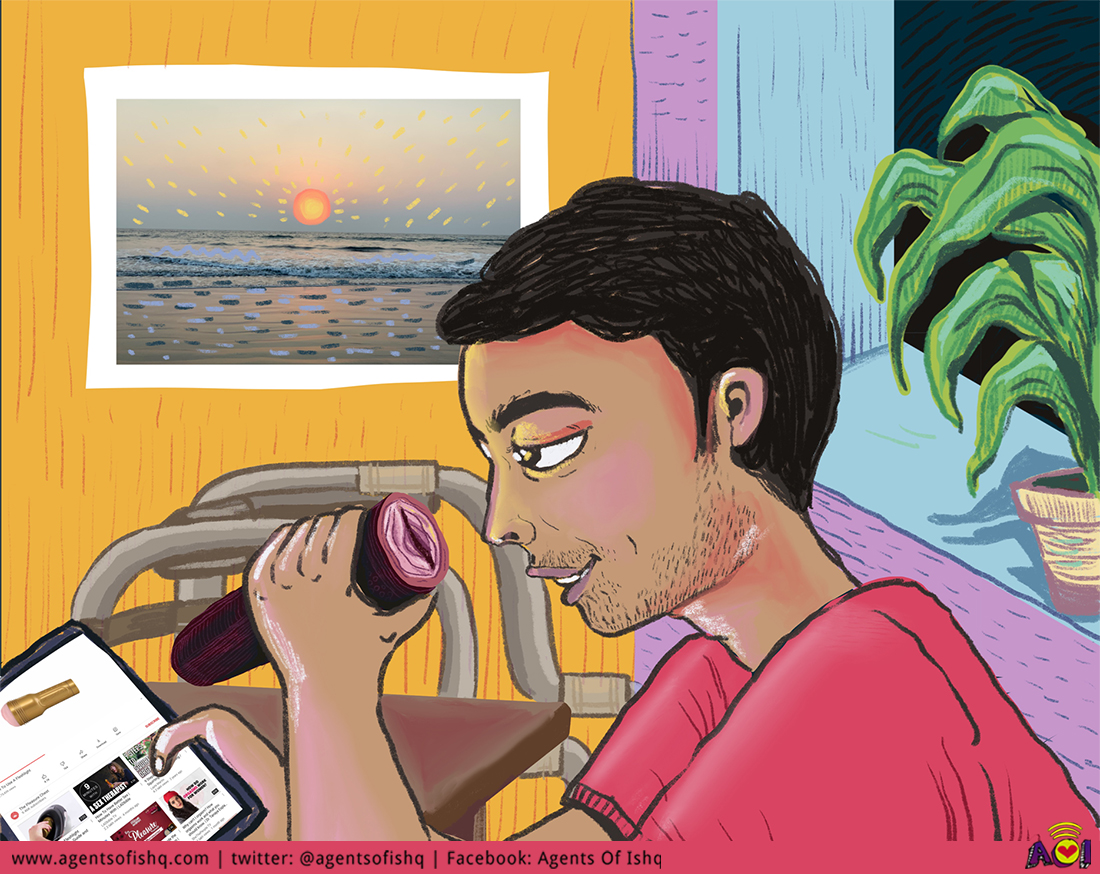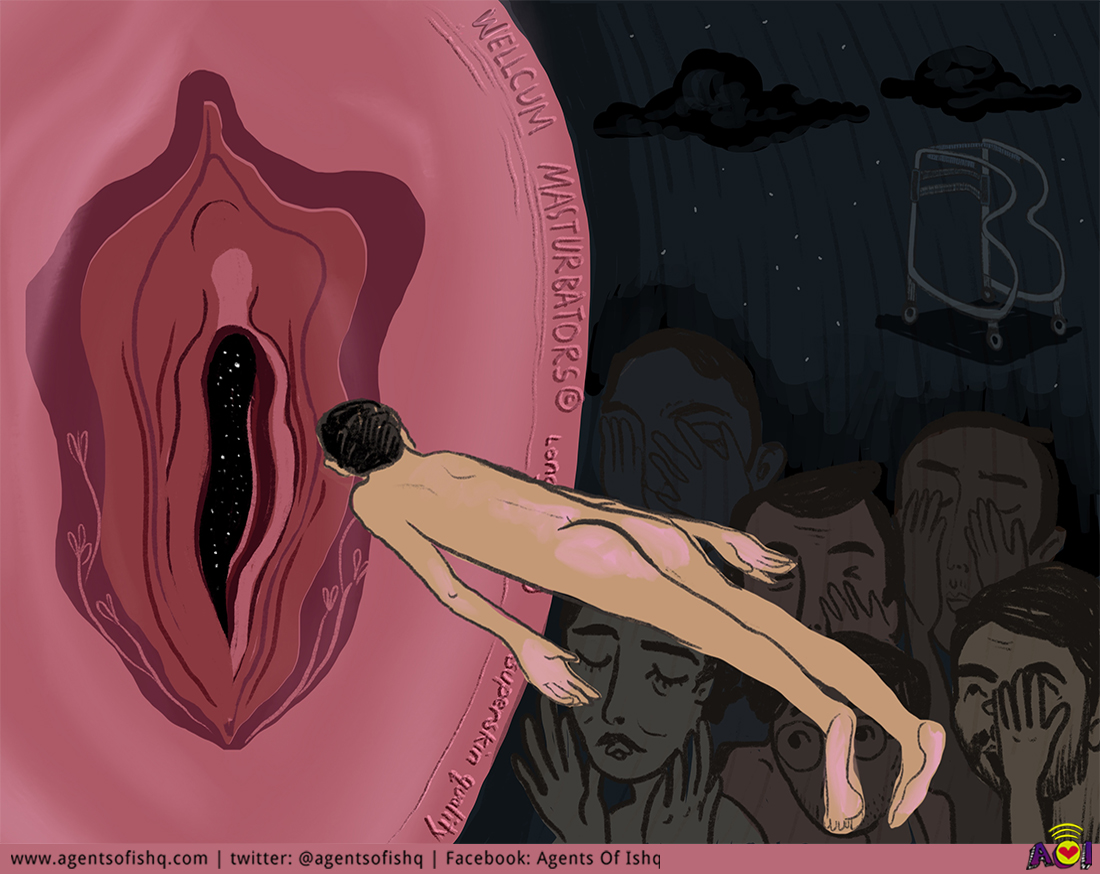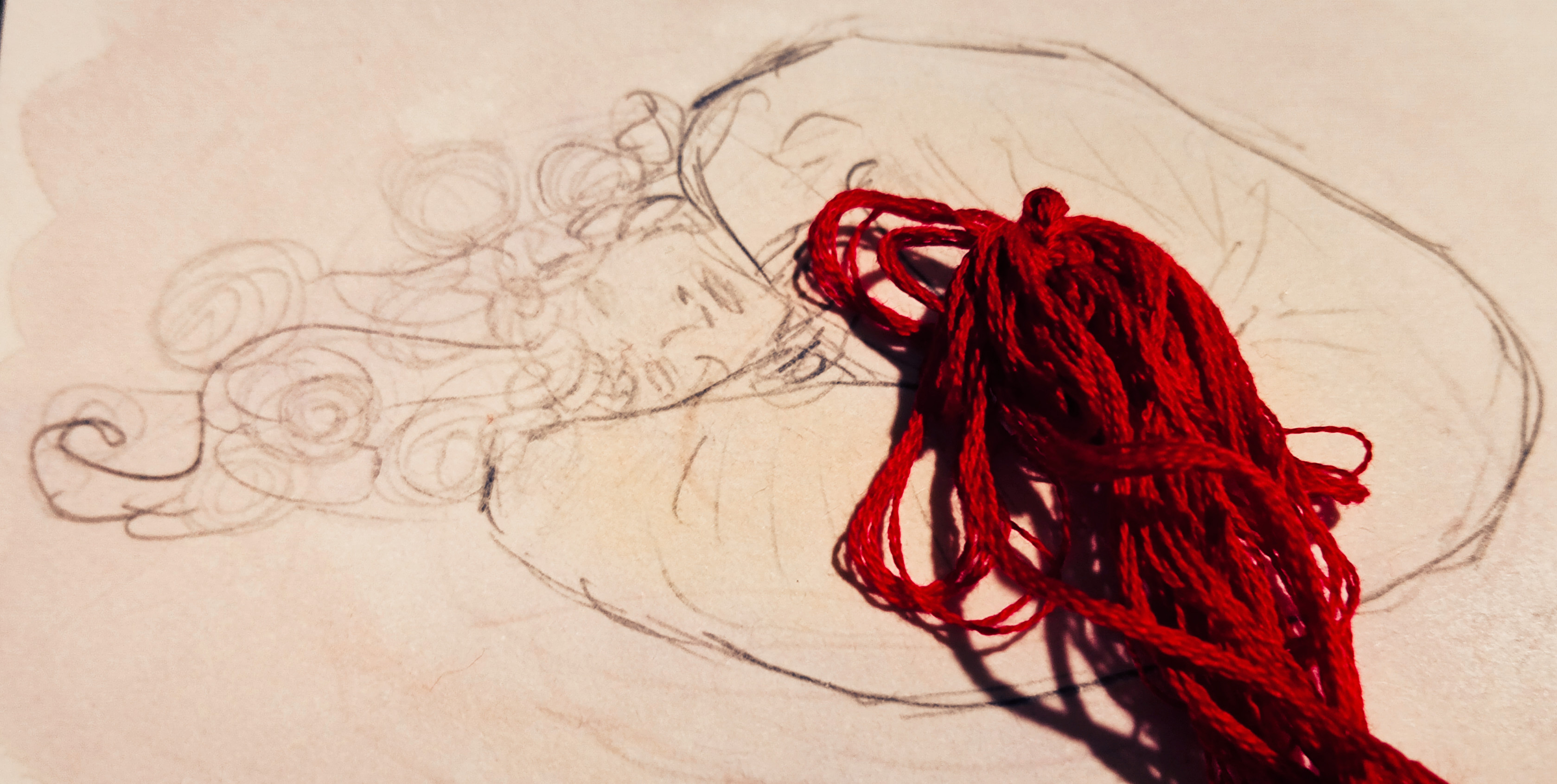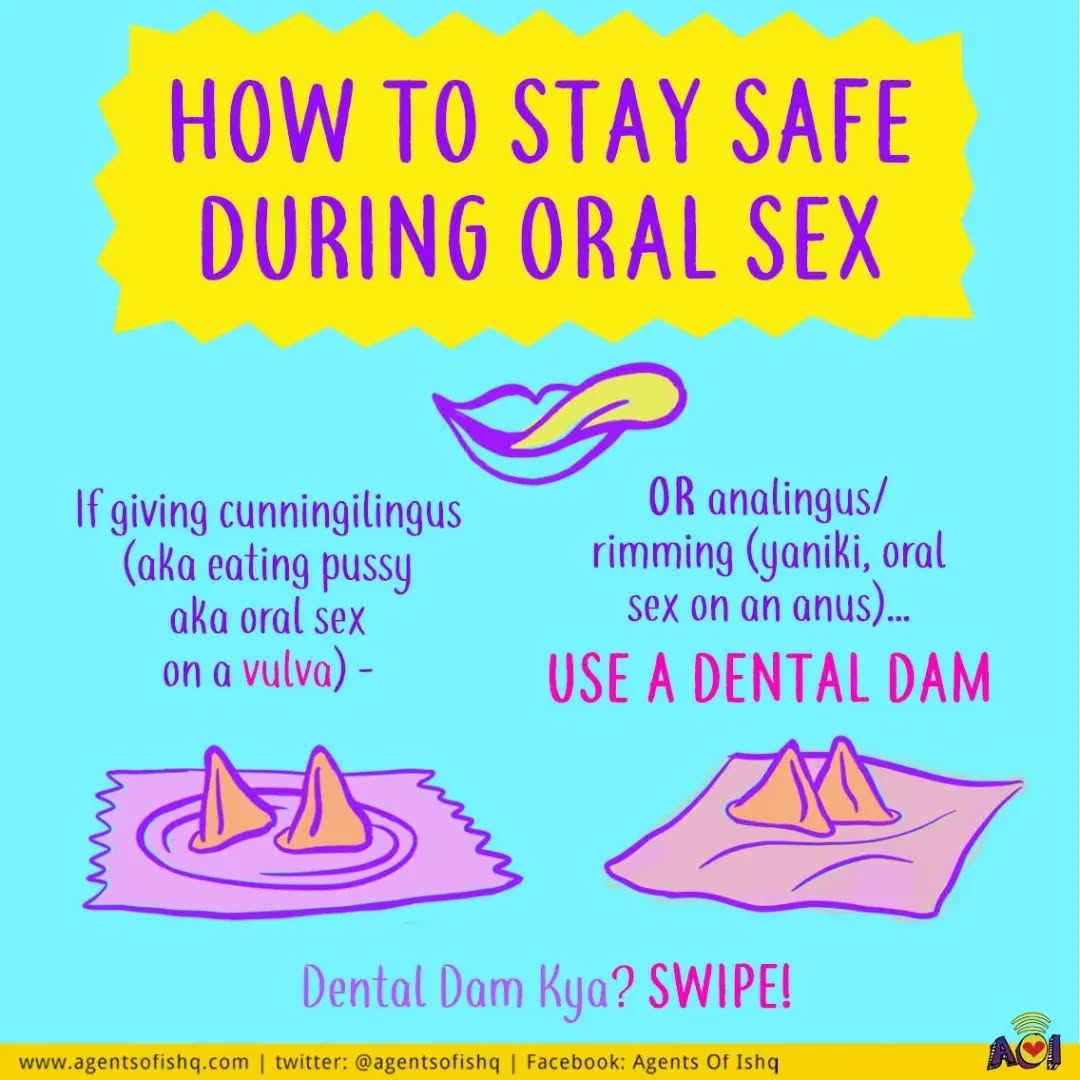At a work-related meeting, I opened my phone to check something, and an advertisement flashed on my phone – for a fleshlight, a male masturbator. In sheer panic, I pressed the phone so hard that it turned off. It was no surprise really, that it appeared. I had been googling fleshlights all night, trapped between deciding whether to invest three thousand rupees on a masturbator, or to rely on my good old hands to do the deed. Moreover, buying a cheap masturbator that was definitely Chinese duplicate maal might have been the start of a hilarious tragedy. I have never heard men around me talk about masturbators. I asked some of my single male friends if they would give it a try, and they looked at me as if I had assaulted their masculinity. There is hardly anything more fragile than the Indian male ego. Especially when talking about sex. Most straight men, in the heteronormative set-up, feel they are entitled to sex. And by extension, women.My own positionality as a disabled, chronically-ill person, forces me to raise these uncomfortable questions because I know I am not entitled to anything. Except maybe love and kindness. It also makes me search for new ways of finding pleasure through my body. The idea of sex within our hetero outlook is so rigid, that anything other than peno-vaginal missionary is considered out of syllabus. This orthodoxy has led to many of my possible relationships ending even before they begin.This one time, I had a urinary tract infection (my Achilles heel) in the middle of a short (and rare) affair that I was involved in. For an able-bodied man, this would have been no big deal. But because of my chronic illness, everything stops working when I am ill. Complete chakka jam. I searched for ways to make it work. A penis extender for three grand; would it work? How should I talk about it? Unfortunately, I couldn't make that decision on time and that affair had to end, somewhat prematurely.Explaining my body before getting into any sort of relationship, long or short, can be embarrassing. It shouldn't be, ideally, but it is. It turns into a booklet of things I can't do. And before I have finished reading out the booklet, my potential partner has moved on. My claims to being a man is often judged by the standards of how an able-bodied straight man is supposed to be, in body and behaviour. No matter what most folks claim, men and women in heteronormative settings are still attracted to typical (sometimes caricature-ish) masculine and feminine traits.When you are disabled, expressing yourself sexually can be difficult. A friend of mine who is quadriplegic, told me of his struggles with pleasuring himself. I was stumped. I hadn't even thought about it before. Giving yourself pleasure suddenly seemed like a privilege. It shouldn't be. There needs to be an apparatus to help severely disabled individuals. We need sex therapists. We need counselling. There is so much to do, and yet, I don't see activists talking about it. It's not easy for most disabled people to tell these stories. Most of them live with their families, who are their primary caretakers. Talking about sex can be a process full of shame and embarrassment. Disability is supposed to be about survival, not desire, apparently.All of this takes me back to one thing -- the idea of male self-pleasure. Why aren't we talking about it? Is it because of the inherent nature of patriarchy where men are always entitled to sex? Or is it the dominant idea of masculinity which sees men in a certain way – ‘everything is working, right?’. It might be a combination of both these factors. It's no surprise that even for able-bodied men, going to a sexologist is taboo. It's on such taboos that most quacks run their businesses, by spray painting men's problems on city walls: "Reach out to your nearest baba or dawakhana."We live in a society where the idea of women pleasuring themselves has been sexualized. It is used as titillating imagery – fine when men talk about it, but when women actually do it, everyone gets jittery. As for men, they can joke about sex and masturbation, but can’t actually talk about it, about doing it, about enjoying it. The heteronormative sexism embedded at the core of what is considered ‘masculine’ sexuality, dictates what kind of pleasure is acceptable and what isn't. In such a setting, finding pleasure, or even talking about it, is regimented by the rules of society.
I have never heard men around me talk about masturbators. I asked some of my single male friends if they would give it a try, and they looked at me as if I had assaulted their masculinity. There is hardly anything more fragile than the Indian male ego. Especially when talking about sex. Most straight men, in the heteronormative set-up, feel they are entitled to sex. And by extension, women.My own positionality as a disabled, chronically-ill person, forces me to raise these uncomfortable questions because I know I am not entitled to anything. Except maybe love and kindness. It also makes me search for new ways of finding pleasure through my body. The idea of sex within our hetero outlook is so rigid, that anything other than peno-vaginal missionary is considered out of syllabus. This orthodoxy has led to many of my possible relationships ending even before they begin.This one time, I had a urinary tract infection (my Achilles heel) in the middle of a short (and rare) affair that I was involved in. For an able-bodied man, this would have been no big deal. But because of my chronic illness, everything stops working when I am ill. Complete chakka jam. I searched for ways to make it work. A penis extender for three grand; would it work? How should I talk about it? Unfortunately, I couldn't make that decision on time and that affair had to end, somewhat prematurely.Explaining my body before getting into any sort of relationship, long or short, can be embarrassing. It shouldn't be, ideally, but it is. It turns into a booklet of things I can't do. And before I have finished reading out the booklet, my potential partner has moved on. My claims to being a man is often judged by the standards of how an able-bodied straight man is supposed to be, in body and behaviour. No matter what most folks claim, men and women in heteronormative settings are still attracted to typical (sometimes caricature-ish) masculine and feminine traits.When you are disabled, expressing yourself sexually can be difficult. A friend of mine who is quadriplegic, told me of his struggles with pleasuring himself. I was stumped. I hadn't even thought about it before. Giving yourself pleasure suddenly seemed like a privilege. It shouldn't be. There needs to be an apparatus to help severely disabled individuals. We need sex therapists. We need counselling. There is so much to do, and yet, I don't see activists talking about it. It's not easy for most disabled people to tell these stories. Most of them live with their families, who are their primary caretakers. Talking about sex can be a process full of shame and embarrassment. Disability is supposed to be about survival, not desire, apparently.All of this takes me back to one thing -- the idea of male self-pleasure. Why aren't we talking about it? Is it because of the inherent nature of patriarchy where men are always entitled to sex? Or is it the dominant idea of masculinity which sees men in a certain way – ‘everything is working, right?’. It might be a combination of both these factors. It's no surprise that even for able-bodied men, going to a sexologist is taboo. It's on such taboos that most quacks run their businesses, by spray painting men's problems on city walls: "Reach out to your nearest baba or dawakhana."We live in a society where the idea of women pleasuring themselves has been sexualized. It is used as titillating imagery – fine when men talk about it, but when women actually do it, everyone gets jittery. As for men, they can joke about sex and masturbation, but can’t actually talk about it, about doing it, about enjoying it. The heteronormative sexism embedded at the core of what is considered ‘masculine’ sexuality, dictates what kind of pleasure is acceptable and what isn't. In such a setting, finding pleasure, or even talking about it, is regimented by the rules of society. It's not just about disability. Self-pleasure is an inherent aspect of one's sexuality. Something that needs to be spoken about and encouraged. It can help in developing different perspectives about pleasure amongst men – as beings who experience pleasure, and not simply take it from others to prove their masculinity. These conversations can contribute to awareness about diverse bodies—something that is the need of the hour. Instead of teaching men to draw maps of conquest, men should be taught to openly embrace their bodies. This will surely help them learn to embrace other bodies, boost their own emotional and psychological well-being, ease the shame and violence around sex, make consent understandable, even automatic, and make this world a better place. The so-called ‘normal’ that heteronormativity loves to categorise people as, disables everyone sexually in some way, and those with disability, even more.Personally, I feel a conversation about self-pleasure could do wonders for men with disabilities. In a world where marriage is the primary gateway to sexual fulfillment and life is full of rejection and unrequited love, finding ways to love themselves, and their bodies, will definitely improve self-image and bring them confidence to be successful in future relationships – and life. Plus, we will have hilarious stories of men's junk getting stuck in Chinese-made masturbators. ROFL. Abhishek Anicca is a writer, poet and researcher. He identifies as a person with disability and chronic illness, which shapes his creative and academic endeavors.
It's not just about disability. Self-pleasure is an inherent aspect of one's sexuality. Something that needs to be spoken about and encouraged. It can help in developing different perspectives about pleasure amongst men – as beings who experience pleasure, and not simply take it from others to prove their masculinity. These conversations can contribute to awareness about diverse bodies—something that is the need of the hour. Instead of teaching men to draw maps of conquest, men should be taught to openly embrace their bodies. This will surely help them learn to embrace other bodies, boost their own emotional and psychological well-being, ease the shame and violence around sex, make consent understandable, even automatic, and make this world a better place. The so-called ‘normal’ that heteronormativity loves to categorise people as, disables everyone sexually in some way, and those with disability, even more.Personally, I feel a conversation about self-pleasure could do wonders for men with disabilities. In a world where marriage is the primary gateway to sexual fulfillment and life is full of rejection and unrequited love, finding ways to love themselves, and their bodies, will definitely improve self-image and bring them confidence to be successful in future relationships – and life. Plus, we will have hilarious stories of men's junk getting stuck in Chinese-made masturbators. ROFL. Abhishek Anicca is a writer, poet and researcher. He identifies as a person with disability and chronic illness, which shapes his creative and academic endeavors.
 I have never heard men around me talk about masturbators. I asked some of my single male friends if they would give it a try, and they looked at me as if I had assaulted their masculinity. There is hardly anything more fragile than the Indian male ego. Especially when talking about sex. Most straight men, in the heteronormative set-up, feel they are entitled to sex. And by extension, women.My own positionality as a disabled, chronically-ill person, forces me to raise these uncomfortable questions because I know I am not entitled to anything. Except maybe love and kindness. It also makes me search for new ways of finding pleasure through my body. The idea of sex within our hetero outlook is so rigid, that anything other than peno-vaginal missionary is considered out of syllabus. This orthodoxy has led to many of my possible relationships ending even before they begin.This one time, I had a urinary tract infection (my Achilles heel) in the middle of a short (and rare) affair that I was involved in. For an able-bodied man, this would have been no big deal. But because of my chronic illness, everything stops working when I am ill. Complete chakka jam. I searched for ways to make it work. A penis extender for three grand; would it work? How should I talk about it? Unfortunately, I couldn't make that decision on time and that affair had to end, somewhat prematurely.Explaining my body before getting into any sort of relationship, long or short, can be embarrassing. It shouldn't be, ideally, but it is. It turns into a booklet of things I can't do. And before I have finished reading out the booklet, my potential partner has moved on. My claims to being a man is often judged by the standards of how an able-bodied straight man is supposed to be, in body and behaviour. No matter what most folks claim, men and women in heteronormative settings are still attracted to typical (sometimes caricature-ish) masculine and feminine traits.When you are disabled, expressing yourself sexually can be difficult. A friend of mine who is quadriplegic, told me of his struggles with pleasuring himself. I was stumped. I hadn't even thought about it before. Giving yourself pleasure suddenly seemed like a privilege. It shouldn't be. There needs to be an apparatus to help severely disabled individuals. We need sex therapists. We need counselling. There is so much to do, and yet, I don't see activists talking about it. It's not easy for most disabled people to tell these stories. Most of them live with their families, who are their primary caretakers. Talking about sex can be a process full of shame and embarrassment. Disability is supposed to be about survival, not desire, apparently.All of this takes me back to one thing -- the idea of male self-pleasure. Why aren't we talking about it? Is it because of the inherent nature of patriarchy where men are always entitled to sex? Or is it the dominant idea of masculinity which sees men in a certain way – ‘everything is working, right?’. It might be a combination of both these factors. It's no surprise that even for able-bodied men, going to a sexologist is taboo. It's on such taboos that most quacks run their businesses, by spray painting men's problems on city walls: "Reach out to your nearest baba or dawakhana."We live in a society where the idea of women pleasuring themselves has been sexualized. It is used as titillating imagery – fine when men talk about it, but when women actually do it, everyone gets jittery. As for men, they can joke about sex and masturbation, but can’t actually talk about it, about doing it, about enjoying it. The heteronormative sexism embedded at the core of what is considered ‘masculine’ sexuality, dictates what kind of pleasure is acceptable and what isn't. In such a setting, finding pleasure, or even talking about it, is regimented by the rules of society.
I have never heard men around me talk about masturbators. I asked some of my single male friends if they would give it a try, and they looked at me as if I had assaulted their masculinity. There is hardly anything more fragile than the Indian male ego. Especially when talking about sex. Most straight men, in the heteronormative set-up, feel they are entitled to sex. And by extension, women.My own positionality as a disabled, chronically-ill person, forces me to raise these uncomfortable questions because I know I am not entitled to anything. Except maybe love and kindness. It also makes me search for new ways of finding pleasure through my body. The idea of sex within our hetero outlook is so rigid, that anything other than peno-vaginal missionary is considered out of syllabus. This orthodoxy has led to many of my possible relationships ending even before they begin.This one time, I had a urinary tract infection (my Achilles heel) in the middle of a short (and rare) affair that I was involved in. For an able-bodied man, this would have been no big deal. But because of my chronic illness, everything stops working when I am ill. Complete chakka jam. I searched for ways to make it work. A penis extender for three grand; would it work? How should I talk about it? Unfortunately, I couldn't make that decision on time and that affair had to end, somewhat prematurely.Explaining my body before getting into any sort of relationship, long or short, can be embarrassing. It shouldn't be, ideally, but it is. It turns into a booklet of things I can't do. And before I have finished reading out the booklet, my potential partner has moved on. My claims to being a man is often judged by the standards of how an able-bodied straight man is supposed to be, in body and behaviour. No matter what most folks claim, men and women in heteronormative settings are still attracted to typical (sometimes caricature-ish) masculine and feminine traits.When you are disabled, expressing yourself sexually can be difficult. A friend of mine who is quadriplegic, told me of his struggles with pleasuring himself. I was stumped. I hadn't even thought about it before. Giving yourself pleasure suddenly seemed like a privilege. It shouldn't be. There needs to be an apparatus to help severely disabled individuals. We need sex therapists. We need counselling. There is so much to do, and yet, I don't see activists talking about it. It's not easy for most disabled people to tell these stories. Most of them live with their families, who are their primary caretakers. Talking about sex can be a process full of shame and embarrassment. Disability is supposed to be about survival, not desire, apparently.All of this takes me back to one thing -- the idea of male self-pleasure. Why aren't we talking about it? Is it because of the inherent nature of patriarchy where men are always entitled to sex? Or is it the dominant idea of masculinity which sees men in a certain way – ‘everything is working, right?’. It might be a combination of both these factors. It's no surprise that even for able-bodied men, going to a sexologist is taboo. It's on such taboos that most quacks run their businesses, by spray painting men's problems on city walls: "Reach out to your nearest baba or dawakhana."We live in a society where the idea of women pleasuring themselves has been sexualized. It is used as titillating imagery – fine when men talk about it, but when women actually do it, everyone gets jittery. As for men, they can joke about sex and masturbation, but can’t actually talk about it, about doing it, about enjoying it. The heteronormative sexism embedded at the core of what is considered ‘masculine’ sexuality, dictates what kind of pleasure is acceptable and what isn't. In such a setting, finding pleasure, or even talking about it, is regimented by the rules of society. It's not just about disability. Self-pleasure is an inherent aspect of one's sexuality. Something that needs to be spoken about and encouraged. It can help in developing different perspectives about pleasure amongst men – as beings who experience pleasure, and not simply take it from others to prove their masculinity. These conversations can contribute to awareness about diverse bodies—something that is the need of the hour. Instead of teaching men to draw maps of conquest, men should be taught to openly embrace their bodies. This will surely help them learn to embrace other bodies, boost their own emotional and psychological well-being, ease the shame and violence around sex, make consent understandable, even automatic, and make this world a better place. The so-called ‘normal’ that heteronormativity loves to categorise people as, disables everyone sexually in some way, and those with disability, even more.Personally, I feel a conversation about self-pleasure could do wonders for men with disabilities. In a world where marriage is the primary gateway to sexual fulfillment and life is full of rejection and unrequited love, finding ways to love themselves, and their bodies, will definitely improve self-image and bring them confidence to be successful in future relationships – and life. Plus, we will have hilarious stories of men's junk getting stuck in Chinese-made masturbators. ROFL. Abhishek Anicca is a writer, poet and researcher. He identifies as a person with disability and chronic illness, which shapes his creative and academic endeavors.
It's not just about disability. Self-pleasure is an inherent aspect of one's sexuality. Something that needs to be spoken about and encouraged. It can help in developing different perspectives about pleasure amongst men – as beings who experience pleasure, and not simply take it from others to prove their masculinity. These conversations can contribute to awareness about diverse bodies—something that is the need of the hour. Instead of teaching men to draw maps of conquest, men should be taught to openly embrace their bodies. This will surely help them learn to embrace other bodies, boost their own emotional and psychological well-being, ease the shame and violence around sex, make consent understandable, even automatic, and make this world a better place. The so-called ‘normal’ that heteronormativity loves to categorise people as, disables everyone sexually in some way, and those with disability, even more.Personally, I feel a conversation about self-pleasure could do wonders for men with disabilities. In a world where marriage is the primary gateway to sexual fulfillment and life is full of rejection and unrequited love, finding ways to love themselves, and their bodies, will definitely improve self-image and bring them confidence to be successful in future relationships – and life. Plus, we will have hilarious stories of men's junk getting stuck in Chinese-made masturbators. ROFL. Abhishek Anicca is a writer, poet and researcher. He identifies as a person with disability and chronic illness, which shapes his creative and academic endeavors.

































































































































































































































































































































































































































































































































































































































































































































































































































































































































































































































































































































































































































